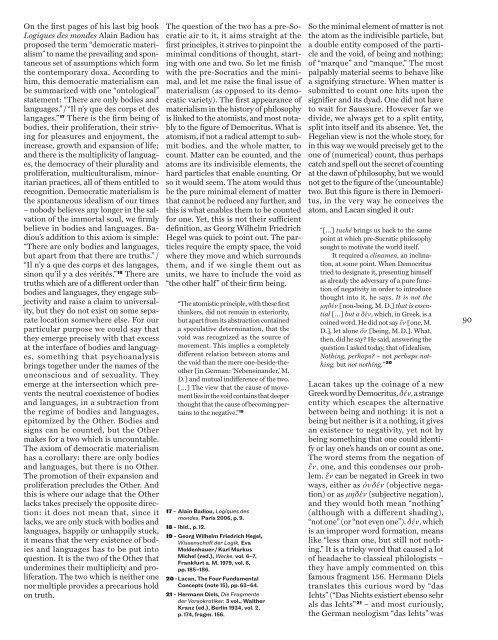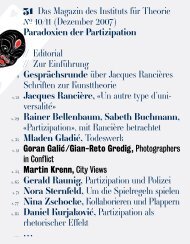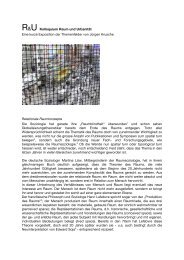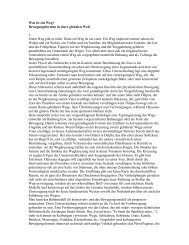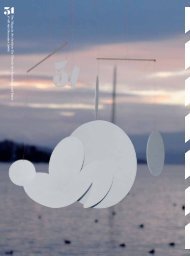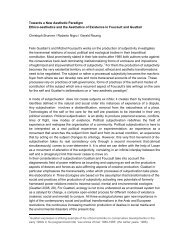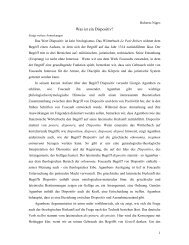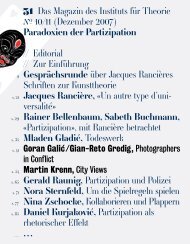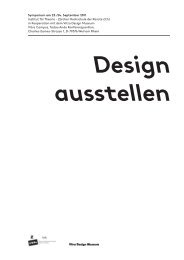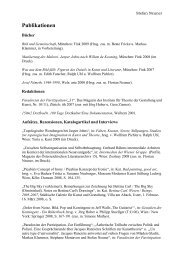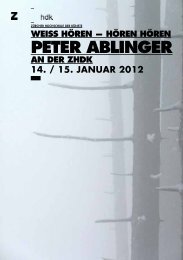Heft - Institut für Theorie ith
Heft - Institut für Theorie ith
Heft - Institut für Theorie ith
Erfolgreiche ePaper selbst erstellen
Machen Sie aus Ihren PDF Publikationen ein blätterbares Flipbook mit unserer einzigartigen Google optimierten e-Paper Software.
On the first pages of his last big book<br />
Logiques des mondes Alain Badiou has<br />
proposed the term “democratic materialism”<br />
to name the prevailing and spontaneous<br />
set of assumptions which form<br />
the contemporary doxa. According to<br />
him, this democratic materialism can<br />
be summarized w<strong>ith</strong> one “ontological”<br />
statement: “There are only bodies and<br />
languages.” / “Il n’y que des corps et des<br />
langages.” 17 There is the firm being of<br />
bodies, their proliferation, their striving<br />
for pleasures and enjoyment, the<br />
increase, growth and expansion of life;<br />
and there is the multiplicity of languages,<br />
the democracy of their plurality and<br />
proliferation, multiculturalism, minoritarian<br />
practices, all of them entitled to<br />
recognition. Democratic materialism is<br />
the spontaneous idealism of our times<br />
– nobody believes any longer in the salvation<br />
of the immortal soul, we firmly<br />
believe in bodies and languages. Ba -<br />
diou’s addition to this axiom is simple:<br />
“There are only bodies and languages,<br />
but apart from that there are truths.” /<br />
“Il n’y a que des corps et des langages,<br />
sinon qu’il y a des vérités.” 18 There are<br />
truths which are of a di≠erent order than<br />
bodies and languages, they engage subjectivity<br />
and raise a claim to universality,<br />
but they do not exist on some separate<br />
location somewhere else. For our<br />
particular purpose we could say that<br />
they emerge precisely w<strong>ith</strong> that excess<br />
at the interface of bodies and languages,<br />
something that psychoanalysis<br />
brings together under the names of the<br />
unconscious and of sexuality. They<br />
emerge at the intersection which prevents<br />
the neutral coexistence of bodies<br />
and languages, in a subtraction from<br />
the regime of bodies and languages,<br />
epitomized by the Other. Bodies and<br />
signs can be counted, but the Other<br />
makes for a two which is uncountable.<br />
The axiom of democratic materialism<br />
has a corollary: there are only bodies<br />
and languages, but there is no Other.<br />
The promotion of their expansion and<br />
proliferation precludes the Other. And<br />
this is where our adage that the Other<br />
lacks takes precisely the opposite direction:<br />
it does not mean that, since it<br />
lacks, we are only stuck w<strong>ith</strong> bodies and<br />
languages, happily or unhappily stuck,<br />
it means that the very existence of bodies<br />
and languages has to be put into<br />
question. It is the two of the Other that<br />
undermines their multiplicity and proliferation.<br />
The two which is ne<strong>ith</strong>er one<br />
nor multiple provides a precarious hold<br />
on truth.<br />
The question of the two has a pre-Socratic<br />
air to it, it aims straight at the<br />
first principles, it strives to pinpoint the<br />
minimal conditions of thought, starting<br />
w<strong>ith</strong> one and two. So let me finish<br />
w<strong>ith</strong> the pre-Socratics and the minimal,<br />
and let me raise the final issue of<br />
materialism (as opposed to its democratic<br />
variety). The first appearance of<br />
materialism in the history of philosophy<br />
is linked to the atomists, and most notably<br />
to the figure of Democritus. What is<br />
atomism, if not a radical attempt to submit<br />
bodies, and the whole matter, to<br />
count. Matter can be counted, and the<br />
atoms are its indivisible elements, the<br />
hard particles that enable counting. Or<br />
so it would seem. The atom would thus<br />
be the pure minimal element of matter<br />
that cannot be reduced any further, and<br />
this is what enables them to be counted<br />
for one. Yet, this is not their su∞cient<br />
definition, as Georg Wilhelm Friedrich<br />
Hegel was quick to point out. The particles<br />
require the empty space, the void<br />
where they move and which surrounds<br />
them, and if we single them out as<br />
units, we have to include the void as<br />
“the other half” of their firm being.<br />
“The atomistic principle, w<strong>ith</strong> these first<br />
thinkers, did not remain in exteriority,<br />
but apart from its abstraction contained<br />
a speculative determination, that the<br />
void was recognized as the source of<br />
movement. This implies a completely<br />
di≠erent relation between atoms and<br />
the void than the mere one-beside-theother<br />
[in German: ‘Nebeneinander,’ M.<br />
D.] and mutual indi≠erence of the two.<br />
[…] The view that the cause of movement<br />
lies in the void contains that deeper<br />
thought that the cause of becoming pertains<br />
to the negative.” 19<br />
17 - Alain Badiou, Logiques des<br />
mondes, Paris 2006, p. 9.<br />
18 - Ibid., p. 12.<br />
19 - Georg Wilhelm Friedrich Hegel,<br />
Wissenschaft der Logik, Eva<br />
Moldenhauer / Karl Markus<br />
Michel (red.), Werke, vol. 6–7,<br />
Frankfurt a. M. 1979, vol. 6,<br />
pp. 185–186.<br />
20 - Lacan, The Four Fundamental<br />
Concepts (note 15), pp. 63–64.<br />
21 - Hermann Diels, Die Fragmente<br />
der Vorsokratiker, 3 vol., Walther<br />
Kranz (ed.), Berlin 1934, vol. 2,<br />
p. 174, fragm. 156.<br />
So the minimal element of matter is not<br />
the atom as the indivisible particle, but<br />
a double entity composed of the particle<br />
and the void, of being and nothing;<br />
of “marque” and “manque.” The most<br />
palpably material seems to behave like<br />
a signifying structure. When matter is<br />
submitted to count one hits upon the<br />
signifier and its dyad. One did not have<br />
to wait for Saussure. However far we<br />
divide, we always get to a split entity,<br />
split into itself and its absence. Yet, the<br />
Hegelian view is not the whole story, for<br />
in this way we would precisely get to the<br />
one of (numerical) count, thus perhaps<br />
catch and spell out the secret of counting<br />
at the dawn of philosophy, but we would<br />
not get to the figure of the (uncountable)<br />
two. But this figure is there in Democritus,<br />
in the very way he conceives the<br />
atom, and Lacan singled it out:<br />
“[…] tuché brings us back to the same<br />
point at which pre-Socratic philosophy<br />
sought to motivate the world itself.<br />
It required a clinamen, an inclination,<br />
at some point. When Democritus<br />
tried to designate it, presenting himself<br />
as already the adversary of a pure function<br />
of negativity in order to introduce<br />
thought into it, he says, It is not the<br />
μηδέν [non-being, M. D.] that is essential<br />
[…] but a δέν, which, in Greek, is a<br />
coined word. He did not say ἕν [one, M.<br />
D.], let alone ὄν [being, M. D.]. What,<br />
then, did he say? He said, answering the<br />
question I asked today, that of idealism,<br />
Nothing, perhaps? – not perhaps nothing,<br />
but not nothing.” 20<br />
Lacan takes up the coinage of a new<br />
Greek word by Democritus, δέν, a strange<br />
entity which escapes the alternative<br />
between being and nothing: it is not a<br />
being but ne<strong>ith</strong>er is it a nothing, it gives<br />
an existence to negativity, yet not by<br />
being something that one could identify<br />
or lay one’s hands on or count as one.<br />
The word stems from the negation of<br />
ἕν, one, and this condenses our problem.<br />
ἕν can be negated in Greek in two<br />
ways, e<strong>ith</strong>er as ὀυδέν (objective negation)<br />
or as μηδέν (subjective negation),<br />
and they would both mean “nothing”<br />
(although w<strong>ith</strong> a di≠erent shading),<br />
“not one” (or “not even one”). δέν, which<br />
is an improper word formation, means<br />
like “less than one, but still not nothing.”<br />
It is a tricky word that caused a lot<br />
of headache to classical philologists –<br />
they have amply commented on this<br />
famous fragment 156. Hermann Diels<br />
translates this curious word by “das<br />
Ichts” (“Das Nichts existiert ebenso sehr<br />
als das Ichts” 21 – and most curiously,<br />
the German neologism “das Ichts” was<br />
90


